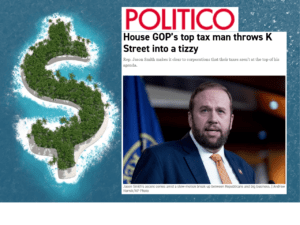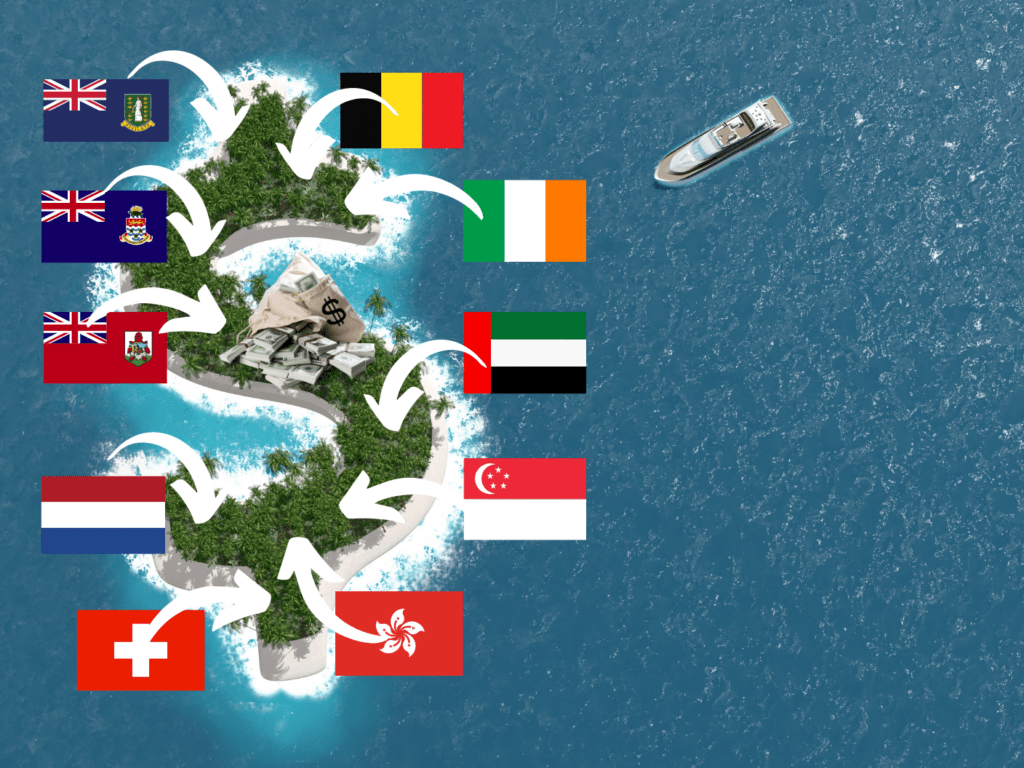There is an obvious change of mood in the new House Ways & Means Committee, and a lot of that derives from new Chairman Jason Smith (R-MO-8).
In an article by Politico on Feb. 23, Smith was depicted as a new Congressman going after the U.S. Chamber of Commerce, notoriously more interested in multinational corporate interests than in Main Street businesses and in reviving the American industrial base. Smith was brought on board in January to lead House Ways & Means, the all-important taxation and tariffs committee.
“Our priorities have changed,” he said in an interview with Politico. “Our priorities are small business, working-class Americans, and farmers over big corporations. These huge companies that get big tax advantages and have very good trade policies that have allowed them to invest billions in China and overlook Americans while they reap all these tax benefits — that’s something we’re going to be looking into.”

The Biden administration has been working on global tax shifts and changes to domestic taxation over the last two years in an attempt to starve offshore tax havens.
Some of these moves go back to the Trump Administration’s negotiations with the Organization for Economic Cooperation and Development’s long-running and complicated tax policy called the Base Erosion Profit Shifting Project. This was an OECD-G20 deal divided up into two pillars. Pillar II was the idea of a global minimum tax rate of 15%, an ideal that would force tax havens in Ireland, Luxembourg, and Singapore to raise corporate taxes. A number of countries have adopted the Pillar II model. The European Union will implement this in 2024. The U.S. has not adopted it yet and it is unclear if it ever will.
Then there is the OECD Pillar I (Amount A) tax deal, still under debate. This one would be an agreement that partially taxes companies where they make a lot of sales. So any global company making more than $20 billion in sales would be liable for profits above 10% of their revenue. But only 25% of those sales would be subject to taxation. Pillar I’s limitations are structured in a way that protects EU multinational businesses that make less than 10% in profits and targets American Tech and Pharmaceutical companies that pay more than 10%.
Meanwhile, Singapore-based companies, including a subsidiary, may be forced to pay a little more with the Pillar II tax changes, but the U.S. is not getting what it needs to protect domestic companies.
CPA advocates for a zero percent exemption under Pillar I. Pillar I shares a great deal with the Sales Factor Apportionment system that taxes all foreign-headquartered companies on their U.S. sales. This means if Apple’s headquarters are in a low-tax jurisdiction like Ireland, all of their iPhone sales revenue from here would be taxed. That is not the case currently, allowing Apple to pay well below the statutory rate for corporations while domestic companies that do not have headquarters offshore pay much more in Federal Income Tax to the IRS.
On the domestic front, the new Inflation Reduction Act (IRA), signed into law by President Biden last year, announced a new corporate alternative minimum tax. This tax addresses the problem of multinationals’ profit shifting around the world. By profit shifting, global corporations like Pfizer end up paying less than half of the C-Corp rate that a domestic pharmaceutical lab is paying. That changed under the IRA law.
The new corporate alternative minimum tax is for companies making at least $1 billion a year on average for three years and charges them a 15% flat tax based on their financial accounting. Some exemptions are still allowed, such as research & development write-offs. Under the IRA, Mr. Global is getting a tax increase after the previous Republican-led House gave him a tax cut.
In an ideal world, the effective tax rate – which is the rate of tax one pays after deductions and write-offs – should be relatively even between the local manufacturer and a corporate giant like Pfizer.
CPA is fine with the OECD’s attempts to fix the profit-shifting game but thinks Washington should not wait for international agreements on sales factor apportionment. Washington can address these issues alone first, said David Morse, tax policy director for CPA.
“The global tax system has become so bloated because we keep trying to preserve the tax system that allows foreign multinationals to offshore their profits,” Morse said. “We need to strip that away and go to the basics. And the basics that are most beneficial for the United States would be taxation based on market access. If you are selling to our market, and making money from our consumers, that should allow us a right to tax you,” Morse said.
***See how China’s fast fashion company SHEIN pays 0% in taxes on the clothes it sells here, while American retailers pay federal income taxes, not to mention real estate and other taxes.***
Politico said that the IRA’s new corporate minimum tax was not Rep. Smith’s main focus on Ways & Means.
(House Ways & Means Committee Chairman Jason Smith) is…taking the Ways and Means Committee on the road, to the districts of his colleagues. After the first trip, to West Virginia, where lawmakers heard from local small business owners, Smith is planning another hearing next month in Oklahoma City. “They don’t have lobbyists in Washington, D.C.,” he said. Smith is part of a contingent of younger Republican lawmakers who think it’s better politics for the party to focus on blue-collar workers; something that also happens to fit Smith’s district, a poor area covering the southeast corner of Missouri. – “House GOP’s Top Tax Man Throws K Street Into a Tizzy” by Brian Faler, Politico, Feb. 23, 2023.
Smith said his top priority was using the tax code to “shore up supply chains” — something that got a lot of attention during the pandemic and which many Democrats want as well.
To whit, most of the talk on Capitol Hill so far regarding this “shoring up” has led to a new turn of phrase there known as “friend-shoring”. This involves convincing companies large and small to move supply chains out of mainland China and into countries friendly to the U.S., which is almost every country in the world other than Russia, Iran, North Korea, and Cuba. Washington should do what it can to entice American businesses to “shore up” in the United States, as it has done successfully with the CHIPS Act and tax incentives for EV automakers and solar in the IRA.
“We have to use our tax and trade mechanisms to make sure we help our strategic supply chains,” Smith told Politico. “We have a lot of gaps.”
In a statement on Jan. 10, CPA CEO Michael Stumo said Chairman Smith “recognizes that federal tax and trade policy must prioritize U.S. domestic producers and workers—not a blind pursuit of free trade that has come at the expense of American workers and gutted our nation’s productive capacity.”
Corporations have shifted nearly $1 trillion in profits earned outside of their home countries to tax havens in 2019, up from $616 billion in 2015, according to a study by the UC Berkeley and the University of Copenhagen published in November.
Chinese Companies Build Factories in Mexico to Exploit “Friendshoring”













